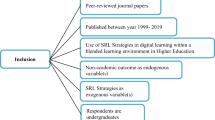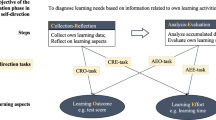Abstract
This article presents an initial study carried out in order to review the student’s response to a learning design based on the Self-directed Based Learning (SDBL), a methodology that was designed in 2013 with the purpose of facilitating the student’s learning process. The design had the purpose of generating a work dynamic that guides the student in their learning process thus increasing the student’s commitment to learning and to guaranteeing both their progress and their academic success. The aim of this research is to identify what kind of activities lead to the learning outcomes assimilation in order to select the ones that are related to the student’s academic success, thus making it possible to identify the relationship between student activity and academic success in order to validate the design and construction of the methodology.
Access this chapter
Tax calculation will be finalised at checkout
Purchases are for personal use only
Similar content being viewed by others
References
Alsina, M., Canaleta, X., Cubeles, A., Torres, R.: Self Directed Based Learning, una metodología de aprendizaje para programas no presenciales. In: Aprendizaje, pp. 325–330. Innovación y Cooperación como impulsores del cambio metodológico. Servicio de Publicaciones Universidad, Madrid, Spain (2019)
Merriam, S.B.: Andragogy and self-directed learning: pillars of adult learning theory. New Dir. Adult Contin. Educ. 2001, 3 (2001). https://doi.org/10.1002/ace.3
Cercone, K.: Characteristics of adult learners with implications for online learning design, vol. 23 (2008)
Joseph, K.: Constructivism & the Cognitive Apprenticeship Model: 11
Lefoe, G.: Creating Constructivist Learning Environments on the Web: The Challenge in Higher Education, vol. 12 (1998)
Silén, C., Uhlin, L.: Self-directed learning – a learning issue for students and faculty! Teach. High Educ. 13, 461–475 (2008). https://doi.org/10.1080/13562510802169756
Alyahyan, E., Düştegör, D.: Predicting academic success in higher education: literature review and best practices. Int. J. Educ. Technol. High. Educ. 17(1), 1–21 (2020). https://doi.org/10.1186/s41239-020-0177-7
Kappe, R., van der Flier, H.: Predicting academic success in higher education: what’s more important than being smart? Eur. J. Psychol. Educ. 27, 605–619 (2012). https://doi.org/10.1007/s10212-011-0099-9
Broadbent, J., Poon, W.L.: Self-regulated learning strategies & academic achievement in online higher education learning environments: a systematic review. Internet High Educ. 27, 1–13 (2015). https://doi.org/10.1016/j.iheduc.2015.04.007
McKenzie, K., Schweitzer, R.: Who Succeeds at University? Factors predicting academic performance in first year Australian university students. High Educ. Res. Dev. 20, 21–33 (2001). https://doi.org/10.1080/07924360120043621
Komarraju, M., Karau, S.J., Schmeck, R.R., Avdic, A.: The big five personality traits, learning styles, and academic achievement. Pers. Individ. Differ. 51, 472–477 (2011). https://doi.org/10.1016/j.paid.2011.04.019
Siddiquei, N.L., Khalid, D.R.: The relationship between personality traits, learning styles and academic performance of E-Learners. Open Prax 10, 249 (2018). https://doi.org/10.5944/openpraxis.10.3.870
Macfadyen, L.P., Dawson, S.: Mining LMS data to develop an “early warning system” for educators: a proof of concept. Comput Educ 54, 588–599 (2010). https://doi.org/10.1016/j.compedu.2009.09.008
Canaleta, X., Solé, X., Salle, L.: Extracción de Conocimiento Original de los Alumnos, vol. 13 (1998)
Romero, C., Ventura, S.: Educational data mining and learning analytics: An updated survey. WIREs Data Min. Knowl. Discov. 10 (2020). https://doi.org/10.1002/widm.1355
Romero, C., Ventura, S.: Educational data mining: a review of the state of the art. IEEE Trans. Syst. Man Cybern. Part C Appl. Rev. 40, 601–618 (2010). https://doi.org/10.1109/TSMCC.2010.2053532
Halde, R.R.: Application of machine learning algorithms for betterment in education system. In: 2016 International Conference on Automatic Control and Dynamic Optimization Techniques (ICACDOT), pp. 1110–1114. IEEE, Pune (2016)
Frank, E., et al.: Weka-a machine learning workbench for data mining. In: Maimon, O., Rokach, L. (eds.) Data Mining and Knowledge Discovery Handbook, pp. 1269–1277. Springer, Boston (2009)
Holmes, G., Donkin, A., Witten, I.H.: WEKA: a machine learning workbench. In: Proceedings of ANZIIS ‘94 - Australian New Zealnd Intelligent Information Systems Conference pp. 357–361. IEEE, Brisbane (1994)
Crivei, L.M., Czibula, G., Ciubotariu, G., Dindelegan, M.: Unsupervised learning based mining of academic data sets for students’ performance analysis. In: 2020 IEEE 14th International Symposium on Applied Computational Intelligence and Informatics (SACI), pp. 000011–000016. IEEE, Timisoara (2020)
Hung, H.-C., Liu, I.-F., Liang, C.-T., Su, Y.-S.: Applying educational data mining to explore students’ learning patterns in the flipped learning approach for coding education. Symmetry 12, 213 (2020). https://doi.org/10.3390/sym12020213
Author information
Authors and Affiliations
Corresponding author
Editor information
Editors and Affiliations
Rights and permissions
Copyright information
© 2023 The Author(s), under exclusive license to Springer Nature Singapore Pte Ltd.
About this paper
Cite this paper
Alsina, M., Canaleta, X., Torres, R. (2023). Students’ Performance and Academic Success Study Using Self Directed Based Learning Methodology. In: García-Peñalvo, F.J., García-Holgado, A. (eds) Proceedings TEEM 2022: Tenth International Conference on Technological Ecosystems for Enhancing Multiculturality. TEEM 2022. Lecture Notes in Educational Technology. Springer, Singapore. https://doi.org/10.1007/978-981-99-0942-1_70
Download citation
DOI: https://doi.org/10.1007/978-981-99-0942-1_70
Published:
Publisher Name: Springer, Singapore
Print ISBN: 978-981-99-0941-4
Online ISBN: 978-981-99-0942-1
eBook Packages: EducationEducation (R0)




